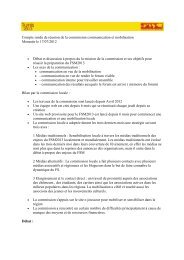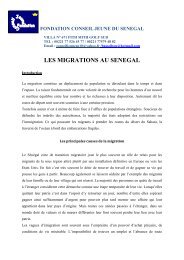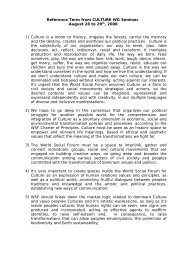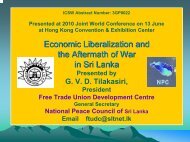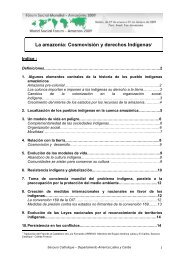You also want an ePaper? Increase the reach of your titles
YUMPU automatically turns print PDFs into web optimized ePapers that Google loves.
<strong>Press</strong> <strong>Report</strong> <strong>Europe</strong> <strong>WSF</strong> <strong>2009</strong><br />
Dieterich, who recently retired as a sociology professor from the Autonomous Metropolitan University in Mexico<br />
City, wrote "21st Century Socialism" about a current of social economic thinking that has been espoused by<br />
left-leaning presidents like Venezuela’s Hugo Chávez and Ecuador’s Rafael Correa.<br />
The main <strong>WSF</strong> gathering is taking place in Belem Jan. 27-Feb. 1. But parallel meetings will be held in different<br />
cities around the world, including Mexico City and the northern Mexican city of Chihuahua on the U.S. border.<br />
"The simple fact of holding the forum is important because it allows organisations, universities, activists and<br />
society to come together and forge connections. But there is a long stretch between that and actually bringing<br />
about changes," Erika Terrazas, an anthropologist at the National School of Anthropology and History in<br />
Chihuahua, commented to IPS.<br />
The broad range of activities at the Jan. 30-Feb. 1 meetings in Mexico will include panels on global and local<br />
problems, conferences, and cultural and artistic events.<br />
"It is hard to actually manage to change things, like the violent crime that we are experiencing here in<br />
Chihuahua, for example," said Terrazas, one of the organisers of the <strong>WSF</strong> meeting in her city. "But just the fact<br />
that we are coming together is a step forward, and that is why we are holding the forum."<br />
Nearly 2,500 people were murdered last year in drug trafficking-related killings in Chihuahua.<br />
The <strong>WSF</strong> initially emerged as a kind of counterpoint to the World Economic Forum, which brings the world’s<br />
economic and political movers and shakers together every year in late January in the Swiss ski resort city of<br />
Davos.<br />
Portuguese sociologist Boaventura de Sousa Santos, a member of the <strong>WSF</strong> International Committee, said the<br />
participants in the Belem meeting should take "a clear and visible stance on the global economic crisis" and how<br />
to confront it.<br />
In Dieterich’s view, the <strong>WSF</strong>, which has brought together social movements, non-governmental organisations<br />
and other civil society groups every year since 2001, usually in the southern Brazilian city of Porto Alegre, has<br />
failed to offer innovative proposals in the past and will not do so in the future.<br />
He said the problems plaguing the global economy today show that "industrial capitalism" is nearing its end,<br />
after "250 years of life," and that it is time "to find a new form of civilisation.<br />
"But the momentum for change will not come out of the <strong>WSF</strong>, which was and is dominated by social democratic<br />
and progressive Christian thinking," he said.<br />
"The <strong>WSF</strong> is more in line with accepting the ‘New Deal’ offered by the new U.S. President Barack Obama,<br />
which translates into a continuation of capitalism, but with slightly greater state intervention and a few other<br />
minor changes," said Dieterich.<br />
The analyst, who in the past was a staunch supporter of Venezuela’s controversial President Chávez, has<br />
gradually taken a more critical position towards his government in the past few months.<br />
Prior to the 2005 <strong>WSF</strong> held in Brazil, Dieterich told IPS that the gatherings did not generate compelling political<br />
statements or commitments, and that they were more like "summer school."<br />
And although he said this week’s meeting in Belem might be different, with the global crisis as its backdrop,<br />
which could "give it a boost," he clarified that he expects it to produce no major changes. (END/<strong>2009</strong>)<br />
Q&A: 'The <strong>WSF</strong> Should Privilege Alternative Media' (IPS)<br />
Alejandro Kirk interviews Boaventura de Sousa Santos *IPS/TerraViva<br />
BELEM, Brazil, Jan 26 (IPS) - Portuguese sociologist Boaventura de Sousa Santos argues that<br />
community radio and alternative media are the only platforms that can compete with corporate media.<br />
In an interview with TerraViva’s Alejandro Kirk, de Sousa Santos stressed that the current crisis<br />
5




